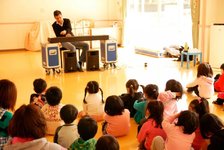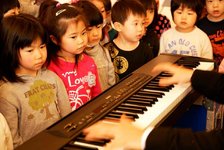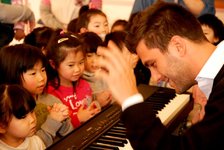You are using an out of date browser. It may not display this or other websites correctly.
You should upgrade or use an alternative browser.
You should upgrade or use an alternative browser.
Keys of Change in Japan: Journey with Hope
- Thread starter Alexandra
- Start date
Τον Μάρτιο του 2012 θα δώσει δύο ρεσιτάλ στην Ιαπωνία ως προσκεκλημένος του JEN (Japan Emergency NGOs): Ένα fundraiser στο Τόκιο και ένα στις πληγείσες περιοχές.
A journey of hope in Japan (part ii)

Keys of Change today announced that founder Panos Karan will return to Japan to perform for communities affected by the 11 March 2011 earthquake and tsunami.
Karan’s first piano recital will take place on 16 Tokyo’s Oji Hall, which will be a fundraising evening for the non-governmental organisation JEN and their relief effort in Tohoku. Karan will then continue to Fukushima, an area heavily affected by the Fukushima Daiichi nuclear disaster, for a collaboration with the Horai Junior High School orchestra, thus giving the unique experience to young students of performing music together with an international pianist. Karan will then continue with eight performances in Minami-soma in Fukushima Prefecture (organised by Amina Sugimoto of the Department of Global Health Policy of the University of Tokyo), and 10 performances in Ishinomaki and Kesennuma in Miyage Prefecture (organised by the non-governmental organisation JEN). Performances will take place in temporary housing around the region, as well as hospitals and schools. Photographer Eloise Campbell will be part of the team for this project.
“The tragedy in Japan touched me deeply,” says Karan. “In 2011 I came to Tohoku to let people affected by this extraordinary disaster know that they are not forgotten, and performed 11 recitals in shelters and temporary housing. I left a part of me in Tohoku and that trip changed me as a pianist and a person. Japan, Tohoku and its people have taught me a sense of dignity and benevolence that has touched me beyond words. This was the most fulfilling thing I ever did as a musician. I feel an everlasting respect to the stoicism and strength of the Japanese people. I am thrilled and honoured to have a chance to return.”

Keys of Change today announced that founder Panos Karan will return to Japan to perform for communities affected by the 11 March 2011 earthquake and tsunami.
Karan’s first piano recital will take place on 16 Tokyo’s Oji Hall, which will be a fundraising evening for the non-governmental organisation JEN and their relief effort in Tohoku. Karan will then continue to Fukushima, an area heavily affected by the Fukushima Daiichi nuclear disaster, for a collaboration with the Horai Junior High School orchestra, thus giving the unique experience to young students of performing music together with an international pianist. Karan will then continue with eight performances in Minami-soma in Fukushima Prefecture (organised by Amina Sugimoto of the Department of Global Health Policy of the University of Tokyo), and 10 performances in Ishinomaki and Kesennuma in Miyage Prefecture (organised by the non-governmental organisation JEN). Performances will take place in temporary housing around the region, as well as hospitals and schools. Photographer Eloise Campbell will be part of the team for this project.
“The tragedy in Japan touched me deeply,” says Karan. “In 2011 I came to Tohoku to let people affected by this extraordinary disaster know that they are not forgotten, and performed 11 recitals in shelters and temporary housing. I left a part of me in Tohoku and that trip changed me as a pianist and a person. Japan, Tohoku and its people have taught me a sense of dignity and benevolence that has touched me beyond words. This was the most fulfilling thing I ever did as a musician. I feel an everlasting respect to the stoicism and strength of the Japanese people. I am thrilled and honoured to have a chance to return.”

...BACK TO JAPAN
17/3/2012
Keys of Change are back to Japan! Panos flew to Tokyo few days ago to continue the Journey of Hope in Japan. It’s been a year since the disastrous earthquake and tsunami, and, despite of the heroic efforts of Japanese people to rebuild their lives, many of still live in temporary housing, displaced by tsunami and a threat of radiation.Hopefully music can brighten their day.
Yesterday, as a warm-up, Panos played a recital in Oji Hall in Tokyo, organised by the NGO JEN, which provides relief effort in Miyagi Prefecture. The concert went really well, with tickets completely sold out! Normally the next day would be a day off, but today Panos drove 300km north to Fukushima, to make it on time for the rehearsal with a student orchestra from the Horai Junior Highschool he visited last year! Tomorrow they will play together Rachmaninov 2nd piano concerto in the beautiful Fukushima Ongakudo concert hall.
From there onwards the schedule is hectic - Panos will play 17 concerts in 7 days, in schools, hospitals, elderly homes, temporary housing and even kindergarden, but it’s all so worthwhile!

19/3/2012
It was a great concert yesterday with Horai Junior Highschool Orchestra in Fukushima Ongakudo concert hall! So many young talented musicians!
Today we have a busy schedule. Panos already played three concerts, one more to go. It feels a little like a journey through life: we started in the kindergarden, with kids aged 3-6 years old. They loved Tchaikovsky’s Nutcracker, and were listening very attentively. Then they asked questions: what is the capital of Greece and the language, what food we eat and what kids do. When they heard that in Greece it’s usually warm and sunny, and children spend a lot of time outdoors, they said that sadly they are not allowed to play outside because of radiation... They all sang for us, one song saying Thank you (Arigato) and another one saying that you must continue tomorrow and have hope. We had tears in our eyes. They gave us flowers and a girl of 4 read (!) a message!
Then we went to Isobe Middle School where many children died in the tsunami. The kids there were very quiet and shy, because the principal is very very strict. We drove around a little bit, and realised that there is almost nothing left from Isobe - the whole town has been wiped out by the tsunami.
Then we went to Soma Highschool. They liked the music very much and we gave them little souvenirs from the Keys of Change. The kids were delighted and then all 60 of them played music and sang for us - they had a brass band!
It’s been really wonderful to share music with all these kids, and see how at any age they would listen with great interest, and share with us their own music, culture, worries, ideas and emotions.
One more recital left for today: tonight Panos will play in the City Hall of Soma, for the general population - hopefully older people can come and listen too!
Ένα βίντεο από την εκτέλεση του 2ου Κοντσέρτου Ραχμάνινοφ με μαθητική ορχήστρα παιδιών γυμνασίου στη Φουκουσίμα. Το αποτέλεσμα είναι εκπληκτικό:
[video=facebook;2555377262744]https://www.facebook.com/photo.php?v=2555377262744[/video]
Rachmaninov 2nd Piano Concerto with the Horai Junior Highschool Orchestra (12-14 years old)
in Fukushima Concert Hall 18/03/12
[video=facebook;2555377262744]https://www.facebook.com/photo.php?v=2555377262744[/video]
Rachmaninov 2nd Piano Concerto with the Horai Junior Highschool Orchestra (12-14 years old)
in Fukushima Concert Hall 18/03/12
Δεν μπορείς να φανταστείς πόσο το ζήλεψα αυτό...Το εκπληκτικό είναι ότι η Φουκουσίμα, πόλη με πληθυσμό περίπου σαν της Πάτρας, και πρωτεύουσα επαρχίας -διοικητικό κέντρο έχει τόσα πολλά παιδάκια που ασχολούνται σοβαρά με μουσική παράδοση τόσο ξένη προς τη δική τους
Upon returning from his trip, Panos wrote:
Only a few hours after my flight back to London, and the tears won't stop flowing. I have tasted the pain, I have touched it with my hands, I felt it with my heart, and now it lives inside me, it has pierced my heart and a part of it will never leave Tohoku. Every face has a story of survival, a story of life and death, of the tsunami, the sight of the destruction, the sounds, the sirens, the missing friends, it is all engraved in the faces. A face of an old fisherman that lost everything, a volunteer that helps others after losing her home and her father, a 10-year old child with the eyes of a grown man. The freezing black water sweeps away everything like a devil, as a student wrote, swallowing everything in its path, indiscriminate, destroying lives, creating wounds, stealing livelihoods.
I wish I could choose one moment from this project and crown it, but there are so many. Playing with 100 middle school students a piano concerto, in a huge concert hall was a very special start. I had the chance to rehearse with them, more than six hours over two days. I could see how hard they were trying, how they were improving, how they were nervous, It was an inspiration to talk to them about the difference of rehearsing and performing, about the opportunity to speak their emotions through music, and to see them responding by discovering expression. I thanked the 13 year old oboe player in particular, who had learned her part by heart, and asked to take a photo with me -- I don't think I ever saw someone run so quickly to get their instrument, or smile so brightly. Then meeting the children in Soma and Minamisoma, the towns right next to the nuclear disaster, students that are not allowed to go out an play, "the children from Fukushima" who are excluded from the whole world, discriminated by others. They were keen to play music for us, with their brass bands, sing to us songs about the hope tomorrow. The kindergarten students gave us paper hand-made medals to thank us, the middle school children sang in a choir. Then the middle school children sent us a letter with the most vivid description of the tsunami -- the devil that covered everything in its pass. And there was also an elementary school, where the principal teaches the remaining seven students the importance of being strong, in order to be able to help and support others. Spending time in the exclusion zone of Fukushima, closed to the outside world for the next 30 years, felt like stepping on grave stones. Time stopped, the town became a shadow of a memory. Everything is unchanged, as if someone pressed "pause", everything left behind untouched, and everything is still there: the visitors book in the Buddhist monastery, with the last log entry on 11.3.2011.
But it is not just the children. "Be strong Ishinomaki" is the message in a memorial in the middle of the devastated area, the space donated to the city by a woman that lost her shop. I will never forget the gentleman in the Minamisoma Hospital, the front line for measuring the effect of radiation on people, that asked his nurse to move his wheelchair closer, and tried to speak, to say something, but only tears came out, tried again, and more tears running from his eyes, wrinkles of pain scarring his face, in the end just whispering "Arigato". One more survivor. There was the lady who used to have a little toy with the music of the Nutcracker, for years in her home, everything gone in the tsunami, who started crying when she heard the music of Tchaikovsky played again. She has gone back to her destroyed home, repaired it, and became in charge of a community centre, handing out more than 300 meals at the height of the crisis. There was the concert in one of the temporary housings, when everyone in the audience was crying at the music of Sakura, desperately trying to hold back the sighs of grief in unison. Smiles and tears, without translation, without words, without language. And the local musical hope: a Yamaha piano damaged by the tsunami and repaired by the shop owner, that has become famous around the world as symbol of rebirth.
Everybody had their own unique, powerful, beautiful way of thanking us, of showing their gratitude. Yet I felt guilty accepting it, because the greatest reward was an audience ready to listen, open to receive from the music -- and I was rewarded generously. A part of me has stayed in Tohoku, aching with the wounds that are still fresh, and I have selfishly taken a part of Tohoku with me, the dignity, the generosity, the kindness, to share with the world and hope that the world will not forget.
I wish I could choose one moment from this project and crown it, but there are so many. Playing with 100 middle school students a piano concerto, in a huge concert hall was a very special start. I had the chance to rehearse with them, more than six hours over two days. I could see how hard they were trying, how they were improving, how they were nervous, It was an inspiration to talk to them about the difference of rehearsing and performing, about the opportunity to speak their emotions through music, and to see them responding by discovering expression. I thanked the 13 year old oboe player in particular, who had learned her part by heart, and asked to take a photo with me -- I don't think I ever saw someone run so quickly to get their instrument, or smile so brightly. Then meeting the children in Soma and Minamisoma, the towns right next to the nuclear disaster, students that are not allowed to go out an play, "the children from Fukushima" who are excluded from the whole world, discriminated by others. They were keen to play music for us, with their brass bands, sing to us songs about the hope tomorrow. The kindergarten students gave us paper hand-made medals to thank us, the middle school children sang in a choir. Then the middle school children sent us a letter with the most vivid description of the tsunami -- the devil that covered everything in its pass. And there was also an elementary school, where the principal teaches the remaining seven students the importance of being strong, in order to be able to help and support others. Spending time in the exclusion zone of Fukushima, closed to the outside world for the next 30 years, felt like stepping on grave stones. Time stopped, the town became a shadow of a memory. Everything is unchanged, as if someone pressed "pause", everything left behind untouched, and everything is still there: the visitors book in the Buddhist monastery, with the last log entry on 11.3.2011.
But it is not just the children. "Be strong Ishinomaki" is the message in a memorial in the middle of the devastated area, the space donated to the city by a woman that lost her shop. I will never forget the gentleman in the Minamisoma Hospital, the front line for measuring the effect of radiation on people, that asked his nurse to move his wheelchair closer, and tried to speak, to say something, but only tears came out, tried again, and more tears running from his eyes, wrinkles of pain scarring his face, in the end just whispering "Arigato". One more survivor. There was the lady who used to have a little toy with the music of the Nutcracker, for years in her home, everything gone in the tsunami, who started crying when she heard the music of Tchaikovsky played again. She has gone back to her destroyed home, repaired it, and became in charge of a community centre, handing out more than 300 meals at the height of the crisis. There was the concert in one of the temporary housings, when everyone in the audience was crying at the music of Sakura, desperately trying to hold back the sighs of grief in unison. Smiles and tears, without translation, without words, without language. And the local musical hope: a Yamaha piano damaged by the tsunami and repaired by the shop owner, that has become famous around the world as symbol of rebirth.
Everybody had their own unique, powerful, beautiful way of thanking us, of showing their gratitude. Yet I felt guilty accepting it, because the greatest reward was an audience ready to listen, open to receive from the music -- and I was rewarded generously. A part of me has stayed in Tohoku, aching with the wounds that are still fresh, and I have selfishly taken a part of Tohoku with me, the dignity, the generosity, the kindness, to share with the world and hope that the world will not forget.
Το εκπληκτικό είναι ότι η Φουκουσίμα, πόλη με πληθυσμό περίπου σαν της Πάτρας, και πρωτεύουσα επαρχίας -διοικητικό κέντρο έχει τόσα πολλά παιδάκια που ασχολούνται σοβαρά με μουσική παράδοση τόσο ξένη προς τη δική τους
Εδώ, στην πατρίδα του Πυθαγόρα, ένας έφηβος θέλει να σπουδάσει σοβαρά μουσική και τον αποθαρρύνουν οι πάντες. Ποια Μουσική Ακαδημία! Εδώ και το Ωδείο Αθηνών (από όπου αποφοίτησαν εξαιρετικά ταλέντα) κινδυνεύει.
Χίλια μπράβο στον Πάνο για την πρωτοβουλία του!
Βιντεάκι δεν υπάρχει ακόμα, προς το παρόν μερικές φωτογραφίες κι ένα μπλογκ ποστ.
http://www.keysofchange.org/Main/Japan/Entries/2012/10/17_back_to_japan.html
http://www.keysofchange.org/Main/Japan/Entries/2012/10/17_back_to_japan.html












